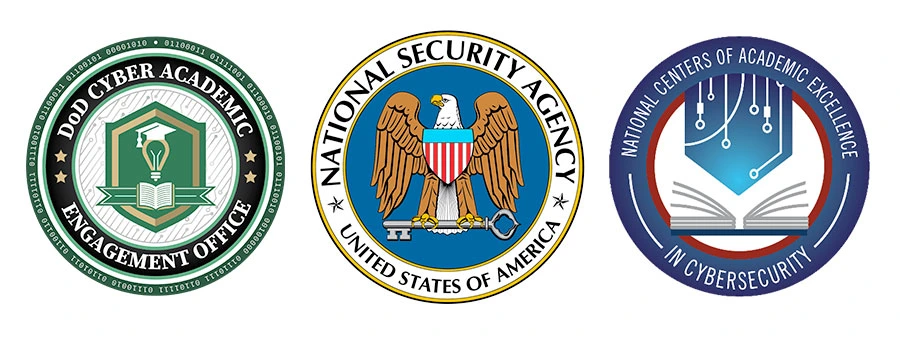The University of Arizona Earns Continued Designation as National Center of Academic Excellence in Cyber Operations
Elite recognition by the National Security Agency affirms the U of A’s leadership in cybersecurity education and opens exclusive opportunities for students and faculty.

The University of Arizona has once again been designated a National Center of Academic Excellence in Cyber Operations (CAE-CO) by the National Security Agency, a recognition that now extends through the 2030 academic year. This prestigious designation affirms U of A’s leadership in cybersecurity education, specifically within the Cyber Engineering emphasis of the top-ranked Bachelor of Applied Science in Cyber Operations.
Currently, only 23 institutions in the United States hold the CAE-CO designation. The University of Arizona is one of just 11 institutions nationwide that hold all three National Centers of Academic Excellence (CAE) designations: Cyber Operations (CO), Cyber Defense (CD) and Cyber Research (R). Together, these honors reflect both the breadth and depth of the university’s cybersecurity programs.

“Holding the CAE-CO designation puts our program in an elite group—and not just in name,” says Assistant Professor Robert Honomichl, who serves as U of A’s point of contact for the CAE-CO. “This recognition validates the technical rigor of our program, our alignment with Department of Defense workforce expectations and our commitment to preparing students with the skills the nation urgently needs.”
The CAE-CO designation is awarded by the NSA in partnership with the Cybersecurity and Infrastructure Security Agency, Federal Bureau of Investigation, National Institute of Standards and Technology/National Initiative on Cybersecurity Education, National Science Foundation, Department of Defense Office of the Chief Information Officer and US Cyber Command. Unlike other cybersecurity designations, CAE-CO emphasizes highly technical knowledge units such as low-level programming, encryption, malware analysis and reverse engineering—skills that are critical for defending national security infrastructure.

Achieving the designation is a rigorous process. It requires not only a review of the curriculum, student outcomes and technical competencies, but also an evaluation of extracurricular engagement, including cyber competitions, student clubs and community outreach.
“It’s not just about what happens in the classroom,” Honomichl says. “Our students participate in national competitions, complete Department of Defense internships and are eligible for exclusive scholarships like DoD’s Cyber Service Academy and the Scholarship for Service (SFS). These are life-changing opportunities that often lead directly to careers in federal cybersecurity.”
For faculty, the designation opens doors to national collaboration. University of Arizona researchers and instructors work closely with colleagues across the CAE community on federally funded projects that include K-12 outreach, teacher academies and cybersecurity workforce development. Recent grants have supported initiatives like the GenCyber Middle School Camp, National Cybersecurity Teachers Academy and Virtual Internship and Varied Innovative Demonstrations (VIVID) project.
Beyond research, faculty members also contribute to the broader CAE ecosystem by mentoring other institutions, serving as application reviewers and leading workshops—such as the Implications of Artificial Intelligence for Educators workshop hosted recently by the College of Information Science in partnership with the National Cybersecurity Training and Education Center and Educational Pathway National Center.
The national CAE designation program began in 1999 to address a growing shortage of qualified cybersecurity professionals—a gap that persists today. Since 2012, the CAE-CO program has aimed to develop a highly skilled federal cyber workforce. Yet, as Honomichl notes, public awareness of cyber operations as a vital career path remains limited.
“We’re still in a moment where many parents and students don’t know that degrees like this exist—or that they’re not only in demand, but essential to national security,” he says. “This designation shines a light on the work we’re doing and the real-world impact our students are having.”
Honomichl, who has been involved with CAE programs since 2008, views the continued designation as both a validation and a responsibility: “I’ve seen firsthand how these programs change lives—students pursuing advanced degrees, earning national scholarships, serving their country in meaningful ways. It’s not just a badge. It’s a community, and one that’s helping to secure the future.”
For more information about the National Centers of Academic Excellence program, visit the CAE Community. To learn more about studying cyber operations at the University of Arizona, explore the BAS in Cyber Operations or Master of Science in Cyber and Information Operations.

